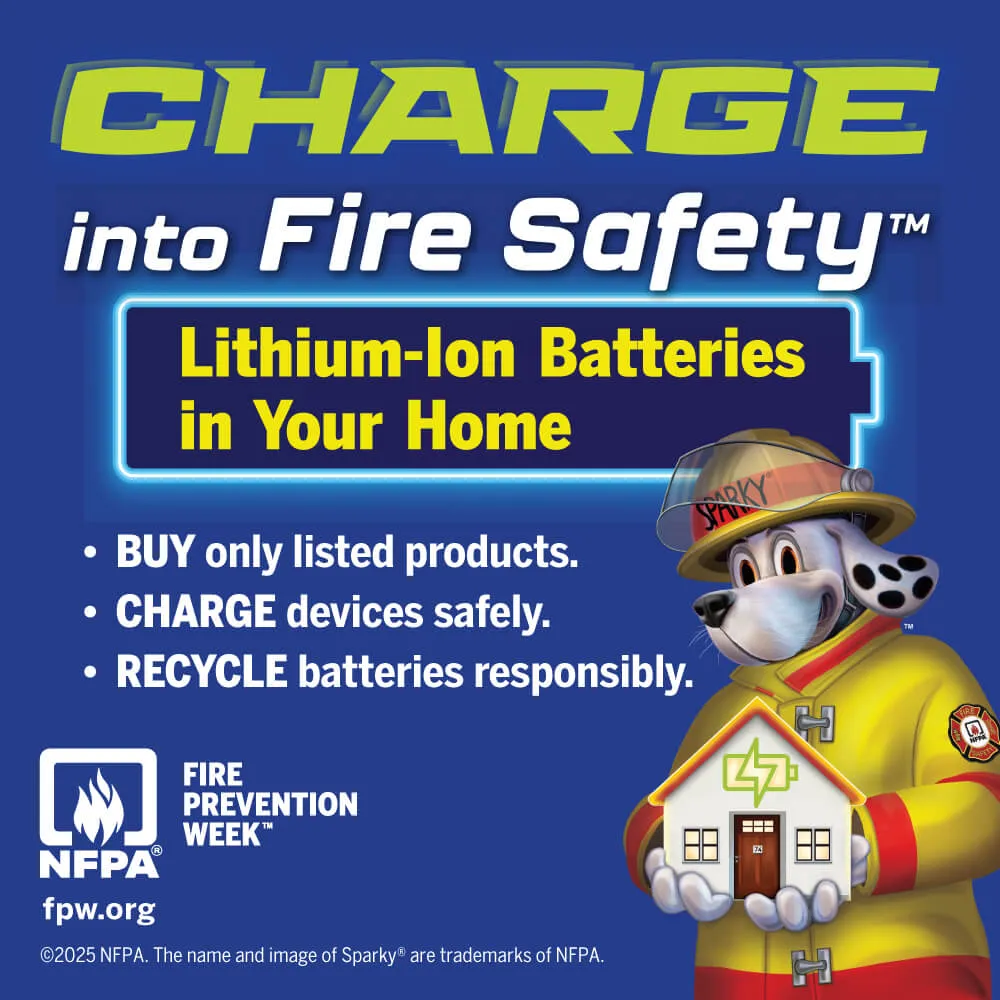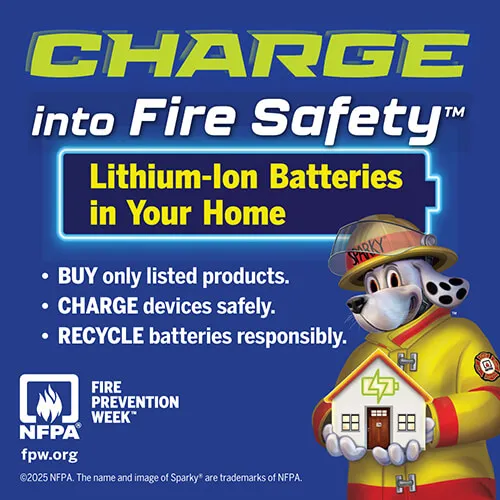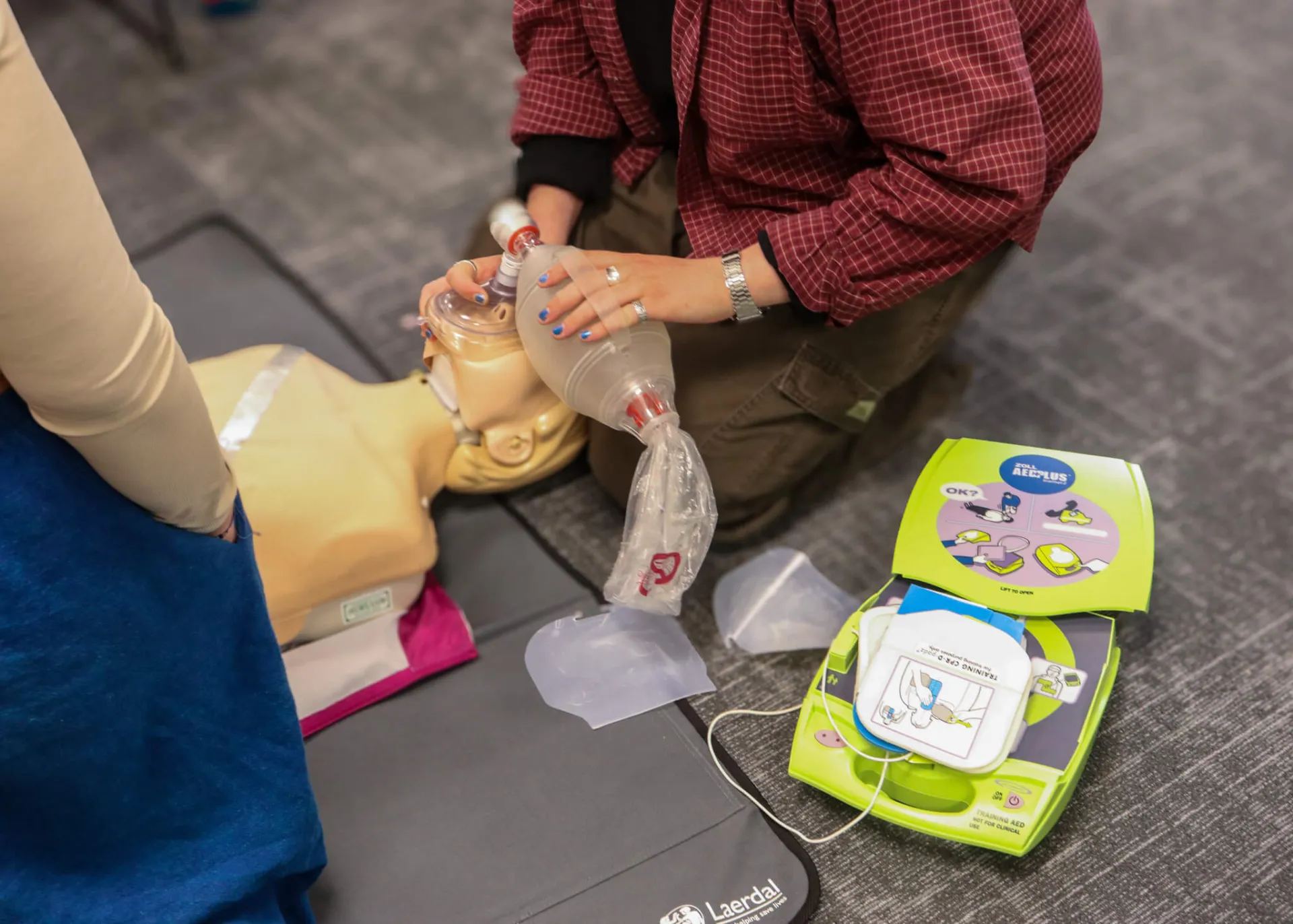Fire Prevention Week is the longest running public health and safety observance on record. The President of the United States has signed a proclamation proclaiming a national observance during that week every year since 1925.
The National Fire Protection Association (NFPA) has been the official sponsor of Fire Prevention Week since 1922. This year’s Fire Prevention Week campaign, “Charge into Fire SafetyTM : Lithium-Ion Batteries in Your Home” works to educate everyone about simple but important actions they can take to keep themselves and those around them safe. It highlights how important it is to buy, charge, and recycle lithium-ion batteries safely.
Most of the electronics we use in our homes every day — smartphones, tablets, power and lawn tools, laptops, e-cigarettes, headphones, and toys, to name just a few — are powered by lithium-ion batteries. In fact, most everything that’s rechargeable uses this type of battery.
If not used correctly or if damaged, lithium-ion batteries can overheat, start a fire, or even explode. To reduce these risks, look around your home — it’s important to know which devices are powered by them. This year’s Fire Prevention Week campaign helps people understand the importance of using these batteries correctly to prevent fires in the home and to follow the Buy, Charge, and Recycle Safely approach.”
Buy only listed products.
When buying a product that uses a lithium-ion battery, take time to research it. Look for a stamp from a nationally recognized testing lab on the packaging and product, which means that it meets important safety standards.
Many products sold online and in stores may not meet safety standards and could increase the risk of fire.
Charge devices safely.
- Always use the cords that came with the product to charge it. Follow the instructions from the manufacturer.
If you need a new charger, buy one from the manufacturer or one that the manufacturer has approved.
Charge your device on a hard surface. Don’t charge it under a pillow, on a bed, or on a couch. This could cause a fire.
Don’t overcharge your device. Unplug it or remove the battery when it’s fully charged.
Recycle batteries responsibly.
- Don’t throw lithium-ion batteries in the trash or regular recycling bins because they could catch fire.
Recycling your device or battery at a safe battery recycling location is the best way to dispose of them. Visit call2recycle.org to find a recycling spot near you.
The Burlington Fire Department will be at the Burlington Farmers Market at 345 Pine St. on Saturday, October 4, 2025 from 9 am to 2 pm with information, demonstrations, hands-on activities, and giveaways in support of this year’s FPW campaign.
To find out more about FPW programs and activities in your community, please contact your local fire department. For more information about Fire Prevention Week and lithium-ion battery safety, visit fpw.org.
If you are a student, faculty member, or staff who live on or off campus in university or privately-owned housing, these safety messages are just as applicable and important. UVM’s Department of Environmental Health and Safety provides detailed guidance on the safe handling, storage, use, and disposal of batteries on campus on their Battery Safety web page. Any member of the UVM community can take our “Fire Safety” course (20-30 minutes long) in the Brightspace learning management system – a direct link to the course is available on the UVM Fire & Life Safety web page – and then sign-up for one of our monthly hands-on fire extinguisher training sessions.
As a general reminder, please review UVM’s Fire Safety Policy:
“Prohibition of certain other items including, but not limited to, hoverboards, e-scooters, and e-bikes in University of Vermont residence halls is covered by the Housing and Meal Plan Terms and Conditions.”
“All employees, students, and visitors are required to evacuate a building when the fire alarm sounds.”
“No person may tamper with fire protection devices, create fire hazards within or near buildings, or cause impediments to emergency egress from buildings.”
These are important procedures designed to keep everyone safe.
To learn more about Fire Prevention Week, go to the NFPA Fire Prevention Week page. For more information about fire and life safety initiatives at the University of Vermont, visit UVM's Fire & Life Safety page or contact University Fire Marshal Barry Simays at firesafe@uvm.edu or (802) 656-8249.


